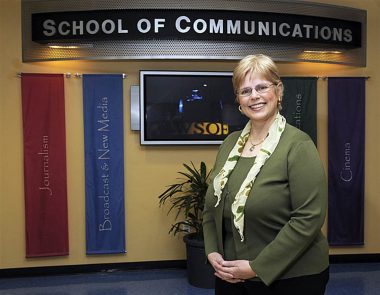An Elon University adjunct instructor was honored this fall for her research on the way companies describe themselves, and how those descriptions give consumers a better understanding of what the business is really saying about its products and services. Linda Gretton, in the School of Communications, won the Association for Business Communication’s Outstanding Dissertation Award at its annual conference.

The ABC describes itself on its web site as an “international organization committed to fostering excellence in business communication scholarship, research, education, and practice.” This is the second year in a row that an Elon faculty member has won the award.
Gretton’s doctoral dissertation for the University of North Carolina at Greensboro profiles the rhetorical strategies of the biotechnical and pharmaceutical industries and how those strategies inform public perception.
“The Rhetorical Helix of the Biotechnology and Pharmaceutical Industries: Strategies of Transformation through Definition, Description, and Ingratiation” determines that the biotech industry is now in what Gretton calls its “honeymoon phase,” with pharmaceuticals taking a backseat.
Gretton is a former director of investor and public relations at Targacept, a biomedical company that develops therapeutics for central nervous system diseases and disorders. But she is also a lover of rhetoric and its powerful ability to control messages.
“The study of rhetoric is wonderful,” she said. “It allows you to look at the meaning and strategy behind the words to observe the intentional use of words for specific purposes.”
Gretton’s dissertation uses the rhetorical theory of dramatism to analyze the rhetoric of the two industries. Dramatism implies that every rhetorical piece, or every bit of language, has a set of actors and scenes. It examines the different ways a single story can be viewed, and does so in a way that inspires questions about how language has influenced the message.
In her dissertation, Gretton offers the example of penicillin. She writes that in accepting the “standard” version of a story, we often neglect or reject other potential narratives. She links this historic story to the pharmaceutical industry in an attempt to understand popular reaction to the business.
She outlines six variations of how Alexander Fleming discovered penicillin in 1928. But with each, she offers a bit of a change in focus on the details of the story. Sometimes Fleming is the hero, and sometimes he’s a man who, through dumb luck, discovered something that would change the face of modern pharmaceuticals.
“It all depends on how you spin the story,” she said. “The strategy behind words is important.”
Gretton teaches strategic writing in the School of Communications, and said she explains to her students the importance of observing and understanding the importance of rhetoric in professional writing.
“You have to understand how the world perceives your identity,” she said. “That gives you a good starting point on how to locate yourself and your brand within the industry you’re trying to reach.”
The Outstanding Dissertation Award was also given last year to Rebecca Pope-Ruark in the Department of English. Pope-Ruark researched the way writers at marketing communication agencies draw on personal knowledge to write effectively, even if they at first know little about their clients’ corporate practices.
– Bethany Swanson ’09


